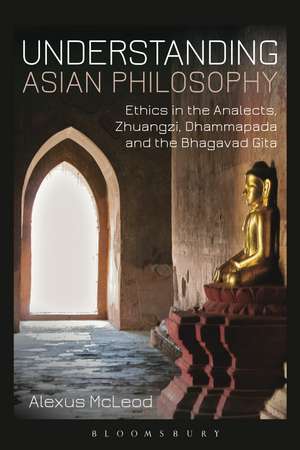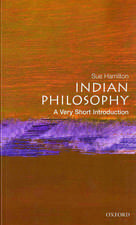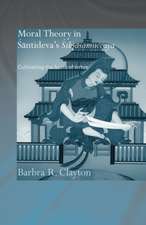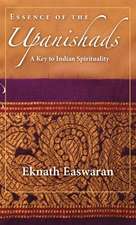Understanding Asian Philosophy: Ethics in the Analects, Zhuangzi, Dhammapada and the Bhagavad Gita
Autor Dr Alexus McLeoden Limba Engleză Paperback – 24 sep 2014
Preț: 184.59 lei
Preț vechi: 227.48 lei
-19% Nou
Puncte Express: 277
Preț estimativ în valută:
35.32€ • 36.88$ • 29.23£
35.32€ • 36.88$ • 29.23£
Carte tipărită la comandă
Livrare economică 04-18 aprilie
Preluare comenzi: 021 569.72.76
Specificații
ISBN-13: 9781780935737
ISBN-10: 1780935730
Pagini: 208
Ilustrații: 8 illus
Dimensiuni: 156 x 234 x 15 mm
Greutate: 0.32 kg
Editura: Bloomsbury Publishing
Colecția Bloomsbury Academic
Locul publicării:London, United Kingdom
ISBN-10: 1780935730
Pagini: 208
Ilustrații: 8 illus
Dimensiuni: 156 x 234 x 15 mm
Greutate: 0.32 kg
Editura: Bloomsbury Publishing
Colecția Bloomsbury Academic
Locul publicării:London, United Kingdom
Caracteristici
Includes primary source material, brief biographies, recommended reading lists and directions to further study resources
Notă biografică
Alexus McLeod is Assistant Professor of Philosophy at Colorado State University, USA.
Cuprins
Introduction: Ethical Philosophy in Asian TraditionsKinds of philosophyEthical theoriesAsian traditionsSelf-cultivation in Asian philosophical traditions-the layout of the bookPart I: Ethics and Self-Cultivation in Ancient ChinaEarly Chinese Philosophy: Map and Timeline1. The Analects of Confucius1.1The Life and Legacy of Confucius and the Analects1.2 Social Harmony1.3 The "Humane" Person and the "Rites"1.4 The Virtues of the Family and Community1.5 A Life of Learning 1.6 The Ideal Person1.7- Later Confucianism1.8 Further Resources on Confucianism and Self-Cultivation1.9 A Short Biography of ConfuciusRelevant Questions2. Zhuangzi and the Daoist Tradition2.1 Yangism, the Daodejing, Zhuang Zhou, and the Retreat from Society2.2 The perspective of the dao2.3 "Fasting of the mind" and "listening ridiculously"2.4 The use of the useless2.5 Delighting in "The transformation of the myriad things," what we truly are, and freedom from suffering2.6 Later Daoism 2.6 Further resources on Zhuangzi and self-cultivation2.7 A Short Biography of ZhuangziRelevant QuestionsPart II: Ethics and Self-Cultivation in Ancient IndiaEarly Indian Philosophy: Map and Timeline3. The Suttas, Dhammapada, and the Early Buddhist Tradition3.1 The Buddha and the Early Buddhist tradition3.2 Suffering and the eightfold path3.3 Controlling the mind3.4 The role of compassion and moral conduct3.5 The role of wisdom and the insubstantiality of the "self"3.6 The enlightened person and nirvana3.7 Later Buddhism a. Early Mahayana b. Madhyamaka c. Chan/Zen d. Pure Land e. Tantrayana3.8 Further resources on Buddhism and self-cultivation3.9 A Short Biography of Siddhartha Gautama, The BuddhaRelevant Questions4. The Message of the Bhagavad Gita4.1 The Background--Vedas, Vedanta, and the Mahabharata4.2 The crisis of choice4.3 Sacred duty and the fruits of action4.4 Discipline--knowledge, action, and devotion4.5 The living universe--Krishna's revelation and its impact4.6 The yogi, the realized soul a. Advaita and Dvaita b. Devotional schools; Vaishnava c. Gandhi's allegorical reading4.7 Further resources on the Gita and self-cultivation4.8 A Short Biography of Vyasa and ShankaraRelevant QuestionsConclusion: New Directions in ScholarshipAnnotated BibliographyIndex
Recenzii
By focusing on transformative personal cultivation as the axis shared by these canonical Asian texts, McLeod makes a persuasive argument that while these texts certainly provide a framework for the ethical life, they are much more, demanding as they do different regimens of assiduous practice and the nurturing of profound religious sensibilities. Highly recommended for classroom use.
Understanding Asian Philosophy delivers what its title promises in a refreshingly clear and concise manner. Well-focused on one key text from each of the four major traditions of Asian philosophy, McLeod's book is an insightful and stimulating introduction to the main issues at stake in these texts and the traditions they helped generate.
Understanding Asian Philosophy delivers what its title promises in a refreshingly clear and concise manner. Well-focused on one key text from each of the four major traditions of Asian philosophy, McLeod's book is an insightful and stimulating introduction to the main issues at stake in these texts and the traditions they helped generate.















